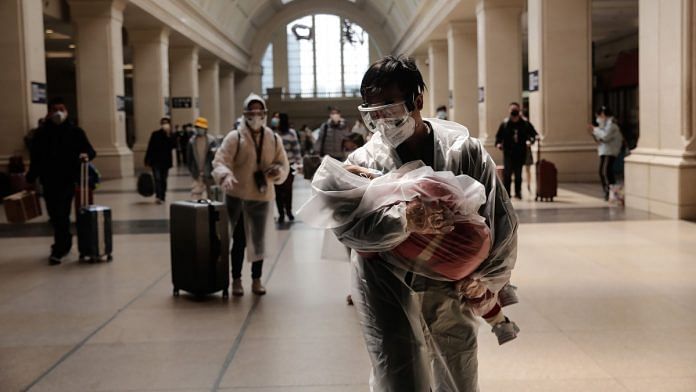New Delhi: Almost half the people who were hospitalised with Covid experience at least one persistent symptom up to 12 months later, said a study published in The Lancet journal Friday.
Shortness of breath and lung impairments lasted the longest — one in three people experienced them, especially if they had suffered from severe Covid, the study revealed.
The study based on 1,276 patients from Wuhan in China, however, found that “most of the symptoms” of Covid in hospitalised patients are resolved within 12 months. Hospitalised Covid survivors were less healthy than people who had not been infected with the SARS-CoV-2 virus, irrespective of their age, sex, and pre-existing conditions, the study revealed.
“While most had made a good recovery, health problems persisted in some patients, especially those who had been critically ill during their hospital stay,” researcher Bin Cao, from the National Center for Respiratory Medicine, China-Japan Friendship Hospital in China, said in a statement.
“Our findings suggest that recovery for some patients will take longer than one year, and this should be taken into account when planning delivery of healthcare services post-pandemic,” he said.
Also read: AY.12 — the new sublineage of Delta variant circulating in India, Israel
Methodology followed
The same team had earlier reported findings from 1,733 hospitalised Covid survivors six months after infection. That study had found around three-quarters of patients had persistent health problems.
For the new investigations, 1,276 out of those 1,733, were followed for further 12 months for a longer health assessment.
The participants of the study had been discharged from hospital between 7 January and 29 May last year. They underwent health checks at six and 12 months from the date they first experienced symptoms.
The team found that many of the symptoms resolved over time, regardless of the severity of the initial infection. The proportion of patients still experiencing at least one symptom after a year fell from 68 per cent at six months to 49 per cent at 12 months.
Fatigue or muscle weakness was the most commonly reported symptom with around half of patients experiencing it at six months. This reduced to one in five patients after a year.
Almost one-third of patients reported experiencing shortness of breath at 12 months — higher than at the 30 per cent reporting such symptoms at six months
At the six-month check, 353 study participants underwent a chest CT scan. Around half of them showed lung abnormalities on their scan and were offered a repeat scan at 12 months.
Of the 118 patients who completed the scan at 12 months, the proportion of patients with abnormalities decreased substantially across all groups but was still high, particularly in the most critically ill group, researchers said.
Tracking vulnerabilities
Compared with men, women were 1.4 times more likely to report fatigue or muscle weakness, twice as likely to report anxiety or depression, and almost three times as likely to have lung impairment after 12 months.
People who had been treated with corticosteroids during the acute phase of their illness with Covid were 1.5 times as likely to experience fatigue or muscle weakness after 12 months, compared to those who had not been treated with corticosteroids during their illness.
The findings will be important to follow up in future research to better understand why Covid symptoms persist in some people, researchers said.
The authors underlined that their study was focused on a single hospital and so patient outcomes may not be applicable for other settings. Additionally, the study included only a small number of patients who had been admitted to intensive care (94) and findings relating to the most critically ill patients should be interpreted with caution, they added.
(Edited by Paramita Ghosh)
Also read: How Indian teen became a NASA ‘panelist’ and almost got away with it



